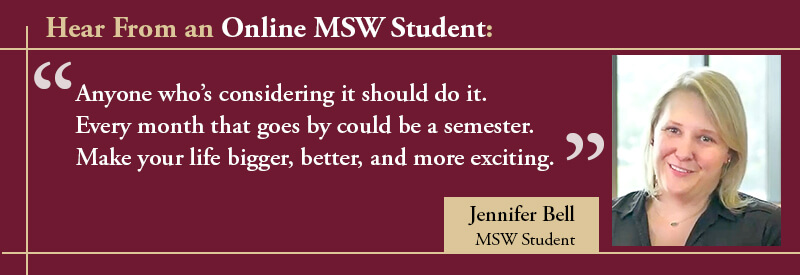5 Ways an Ecological Approach to Social Work Alleviates Economic Injustice

By Katie Krukenberg, MSW, LCSW
Katie Krukenberg is an MSW graduate (2006) from Florida State University and a licensed clinical social worker in North Dakota. She works at the University of Mary and is an assistant professor of social work as well as the director of field education for the social work program.
Students in Florida State University’s online MSW program learn about the ecological approach to social work, which emphasizes understanding a person in a holistic way (factoring in their biological, psychological, social, and environmental factors) and the transactions that take place between the person and their environment. Social workers engage in practice at all levels, including micro, mezzo, and macro, which is aided by an ecological approach that looks at all factors that influence the changing social justice issues faced by social workers. Here are 5 ways an ecological approach to social work alleviates economic justice:
1. Strengths and Solutions
One of the defining features of social work is the strengths based nature of the field as it pertains to all parts of practice, including social justice issues. In addition to being strengths based, social workers are solution focused in their approach to identifying needs and targeting interventions in a way that creates sustainable change. This requires work at all system levels, and an ecological approach is critical to understanding what strengths exist that can be built upon to find creative solutions to challenges faced by individuals or communities.
2. Cultural Awareness
The NASW Code of Ethics devotes a section to social worker ethical responsibilities pertaining to Cultural Awareness (1.05), highlighting both the importance as well as ethical obligation to cultural awareness from an ecological approach (section c): “Social workers should obtain education about and seek to understand the nature of prejudice with respect to race, national origin, color, sex, sexual orientation, gender identity or expression, age, marital status, political belief, religion, immigration status, and mental or physical ability.” Social workers who are knowledgeable about the ecological impact to clients in each of these areas will be better positioned to intervene in a way that maintains relationships with clients and promotes social justice.
3. Dual Diagnosis
Working with clients with dual diagnosis of substance abuse and mental health issues has long been a chicken-or-the-egg type argument in social work, as it can be challenging to determine which is the more primary or greatest impacting condition. An ecological approach would suggest spending less time on these questions, and more effort on identifying appropriate resources and advocating for policies and programming to fill gaps in the service delivery system. Because of the high co-morbidity of these two diagnoses, understanding the factors in a person’s environment that sustain the problems and identifying a systematic response are the keys to breaking the cycle. An example might be inpatient facilities that integrate cultural awareness and allow for treatment of addiction and mental health that works together rather than in silos. Treatment centers that allow mothers to bring children with them, or provides transportation and child care assistance to eliminate barriers to accessing services are also promising practices from an ecological perspective. They would ensure that clients don’t have to sacrifice one area of their life in order to focus on another.
4. Housing First Initiatives
In many communities, one of the requirements to be allowed to stay in emergency homeless shelters is sobriety from drugs and alcohol. This is particularly challenging as the challenge of homelessness is often multifaceted, and a person’s struggle with mental health or addiction may have been a source of their homelessness. In regions with severe weather people may end up dying due to the elements with no safe shelter. Noncompliance with this common requirement is sometimes viewed as a choice on the client’s part, or not prioritizing their need for housing. House First Initiatives introduce the idea that housing needs to be a first priority, and that ensuring safe housing may open the door to being able to partner with people to seek services and experience meaningful change pertaining to the other challenges they are experiencing. Maslow’s Hierarchy of Needs indicates that basic needs must be met before anything else can be done. Housing First Initiatives are intended to provide a safe place for people to be in order to establish safety and consistency that will hopefully lend itself to greater engagement with the service delivery system.
5. Poverty
Tackling poverty is an issue that requires the best of what social work stands for at all levels, and in a variety of areas encompassed by an ecological approach. Accessibility of social workers that are knowledgeable about a variety of programs and assistance for various needs is critical to assisting clients most severely impacted by poverty. Increasing awareness in communities is a task that requires engaging community members, stakeholders, funding streams, and opportunities for collaboration. Social workers who work directly with clients impacted by poverty will soon discover what service delivery gaps exist, and whether they are related to availability, accessibility, or adequacy. This puts social workers in a position to be able to advocate for addition or expansion of services or to engage in social policy involvement, and be a voice for vulnerable members of the community in a way that promotes economic justice.
Complete The Form to Access Your MSW Program Guide
Read more of FSU online's top Master of Social Work blogs below:
